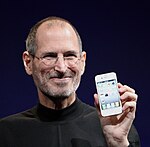User:Twinsday/sandbox
- gray
- dark gray
- black
- tan
- khaki
- olive
- maroon
- dark red
- red
- orange
- yellow
- yellow green
- green
- blue green
- blue
- indigo
- blue violet
- purple
- America's Favorite Non-Christians
-
Bill Gates
(agnostic) -
Steve Jobs
(Zen Buddhist) -
Mark Zuckerberg
(atheist)
A 2012 study by the Pew Forum on Religion & Public Life reported, "The number of Americans who do not identify with any religion continues to grow at a rapid pace. One-fifth of the U.S. public – and a third of adults under 30 – are religiously unaffiliated today, the highest percentages ever in Pew Research Center polling."[1]
A 2012 study by the Pew Forum on Religion & Public Life estimated that about one-fifth of the U.S. adult population are religiously unaffiliated.[1]
A 2011 Gallup poll reported, "Three in 10 Americans interpret the Bible literally, saying it is the actual word of God. That is similar to what Gallup has measured over the last two decades, but down from the 1970s and 1980s. A 49% plurality of Americans say the Bible is the inspired word of God but that it should not be taken literally, consistently the most common view in Gallup's nearly 40-year history of this question. Another 17% consider the Bible an ancient book of stories recorded by man."[2]
A 2012 Gallup poll reported, "Forty-six percent of Americans believe in the creationist view that God created humans in their present form at one time within the last 10,000 years. The prevalence of this creationist view of the origin of humans is essentially unchanged from 30 years ago, when Gallup first asked the question. About a third of Americans believe that humans evolved, but with God's guidance; 15% say humans evolved, but that God had no part in the process."[3]
A 2012 Ipsos poll reported, "One in seven (14%) global citizens agree 'the world will come to an end during my lifetime,' according to a new poll by global research company Ipsos on behalf of Reuters News. One in ten (10%) believe 'the Mayan calendar, which some say 'ends' in 2012, marks the end of the world' and another one in ten (8%) admit they 'have been experiencing anxiety or fear because the world is going to end in 2012.' The poll was conducted among 16,262 adults in 21 countries."[4]
Vanity Fair reported, "On television alone, the scenes were witnessed that day by an estimated two billion people – a third of the human race."[5]
A 2008 poll (of 17 countries) conducted by WorldPublicOpinion.org reported, "On average, 46 percent said that al Qaeda was behind the attacks while 15 percent say the US government, seven percent Israel, and seven percent some other perpetrator. One in four said they do not know."[6]
See also
[edit]References
[edit]- ^ a b "'Nones' on the Rise: One-in-Five Adults Have No Religious Affiliation". Pew Forum on Religion & Public Life. October 9, 2012.
- ^ Jones, Jeffrey M. (July 8, 2011). "In U.S., 3 in 10 Say They Take the Bible Literally". Gallup.
- ^ Newport, Frank (June 1, 2012). "In U.S., 46% Hold Creationist View of Human Origins". Gallup.
- ^ "One in Seven (14%) Global Citizens Believe End of the World is Coming in Their Lifetime". New York: Ipsos. May 1, 2012.
- ^ "Rare Scenes from 9/11". Vanity Fair. Condé Nast. September 1, 2006.
- ^ "International Poll: No Consensus On Who Was Behind 9/11". WorldPublicOpinion.org. September 10, 2008.



